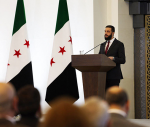You are here
Iraq probes find Israel behind ‘some’ base attacks — MP
By AFP - Aug 31,2019 - Last updated at Aug 31,2019
BAGHDAD — Iraq’s government is preparing a complaint to the UN after finding Israel is “certainly” behind several attacks on Hashed Al Shaabi bases, a parliamentarian and leading member of the force said.
The Hashed network of paramilitary groups has blamed both Israel and the US for a string of blasts and drone sightings at its bases in recent weeks.
Baghdad has thus far refrained from making accusations but said it was studying “indications of foreign involvement”.
Ahmad Al Assadi, a Hashed official and spokesman for its parliamentary bloc “Fatah”, told journalists on Thursday in his Baghdad office that government probes would name Israel.
“Some of the government investigations have reached a conclusion that the perpetrator behind some of the attacks is absolutely, certainly Israel,” he said, declining to provide details on the evidence.
“The government is preparing sufficient evidence and documents to complain to the [UN] Security Council. It won’t submit a complaint against an unknown entity.”
The Hashed was established in 2014 from mostly-Shiite armed groups and volunteers to fight the Daesh group and is now formally part of Iraq’s armed forces.
But the US and Israel fear some units are an extension of their arch-foe Iran and have been equipped with precision-guided missiles that could reach Israel.
Since mid-July, five Hashed arms depots and camps have been targeted in apparent attacks and the group said it had fired at surveillance drones over two other bases.
Hashed top officials have said the US is broadly “responsible” but specifically blamed Israeli drones for the latest strike on Sunday, which killed a Hashed fighter near Iraq’s western border with Syria.
The Pentagon has denied responsibility and said it is cooperating with Iraq’s investigations, but Israel has neither confirmed nor denied involvement.
‘Ready to respond’
Assadi told reporters the US role remained unclear, dulling the group’s earlier accusations.
“Israeli planes supported by the US? We can’t make that accusation. Did America give a green light? We can’t make that accusation,” he said.
But, Assadi added, the Hashed had been expecting an attack as US-Iranian tensions rose after Washington withdrew from a landmark nuclear deal with Tehran last year.
The US has since imposed tough sanctions on Iran as well as several Hashed leaders and factions.
“Are the attacks that happened surprising for the Iraqi government, the Hashed, or other factions? Of course not,” Assadi said.
“It’s clear. The Hashed is being specifically targeted.”
He did provide some details on the government probe into the August 13 blasts at the Saqr military base near Baghdad, where Hashed fighters are based, and which Assadi said involved three drones.
“The first drone surveiled, the second attacked and the third took pictures of the base after the strike,” he said.
Losses for a single brigade there were estimated at a billion Iraqi dinars, or more than $800,000, the lawmaker added.
He denied allegations that long-range Iranian missiles were stored at the attacked sites and evaded an AFP question on the group’s role in transferring weapons to neighbouring Syria.
Assadi, formerly the Hashed’s spokesman and still a leader within the group, attended a meeting earlier this week between its top brass and Iraq’s president, premier and parliament speaker.
“We said in the meeting that the resistance factions are ready to respond now if the government wanted that. If you want a response in Iraq, against Israel, in any area,” said Assadi.
But he stressed the Hashed would abide by the government’s policy of prioritising diplomacy.
“The Hashed will not fire a single bullet or give a statement or issue a position if it’s not coordinated with the government,” Assadi added.
Related Articles
BAGHDAD — Iraq's top government officials met with leading members of the Hashed Al Shaabi on Monday after a purported Israeli strike on the
BAGHDAD — Iraq's premier has said for the first time that his government had "indications" Israel was behind some attacks on paramilitary ba
BAGHDAD — A top adviser to Iraqi Prime Minister Mustafa Al Kadhemi has sparked anger among pro-Tehran factions in Baghdad with comments abou













